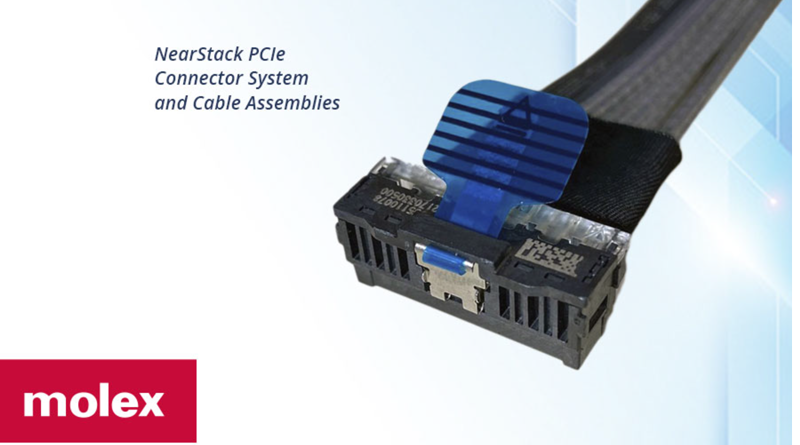Molex Launches PCIe Cable Connection System for Open Compute Project Servers
Molex has announced the release of its NearStack PCIe Connector System and Cable Assemblies for next-gen servers. Developed in collaboration with members of the Open Compute Project (OCP), NearStack PCIe replaces traditional paddle-card cable solutions to optimize signal integrity and improve system performance.
A standout feature of NearStack PCIe is its direct-to-contact Twinax termination, which eliminates the need for paddle cards within the cable assembly. Unlike competing cable jumpers, which are terminated by hand-soldering cables onto a PCB paddle card, NearStack uses a fully automated wire termination process. This high-precision process improves manufacturing efficiencies, repeatability, and signal integrity.
“Thanks to its superior construction, NearStack PCIe is ideal for next-generation PCIe Gen-5 and Gen-6 system implementation,” said Bill Wilson, new product development manager, at Molex Enterprise Solutions. “The product is capable of 32-Gbps NRZ data rates, enabling server OEMs to achieve unprecedented performance.”
Critical Components for the Open Compute Project
The Open Compute Project is a consortium of industry leaders dedicated to combining the best available technologies into standardized hardware development with high-speed and high-bandwidth capabilities.
NearStack PCIe was defined and adopted as a standard by the Small Form Factor (SFF) committee as SFF-TA-1026, and OCP recommends the technology as “TA-1026” for server reference designs. NearStack PCIe also has been included in the OCP Modular – Extensible I/O (M-XIO) specification and the Modular – Full-Width HPM Form Factor (M-FLW) as part of the next-generation OCP Data Center – Modular Hardware Systems (DC-MHS) family. As part of an open SFF standard, the technology is available to second-source vendors under a reasonable and non-discriminatory (RAND) license. NearStack PCIe already has been second-sourced through these licenses, with additional licenses offered to multiple vendors. This strategy ensures inter-vendor operability between Molex and other vendors while creating a robust supply chain.
Mechanical Design Optimizes Space, Simplifies Integration
Molex has optimized the cable assemblies for efficient use of space as well as the safe and easy attachment. Smart, rugged mechanical features, along with the optional “angle-exit” cable design, let technicians easily plug the jumpers into crowded boards. In addition to alleviating space constraints, NearStack PCIe offers a low-mated profile for improved airflow management and minimizes interference with neighboring components.
NearStack PCIe further simplifies integration through support for hybrid cables, with a NearStack PCIe connector on one end and a legacy connector on the other. These connectors provide a streamlined upgrade path for existing equipment, which enables customers to take advantage of the new technology immediately without redesigning or replacing current hardware.

